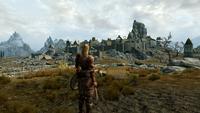I play video games. I’m not talking about casual games you download on your phone—not that there's anything wrong with that. In fact, the increasing visibility of casual gaming is a part of why I finally felt comfortable telling people that I own a gaming console. I favor games with sweeping narratives, lots of little side quests, and hours of gameplay—times two if it’s the kind of game that has several possible endings which depend on the decisions you make as you play, like the Dragon Age or Mass Effect series. I also enjoy puzzle and strategy games, in which the classic problem-solving grid of a chessboard or maze is reimagined with more color and dimension, as in the Portal and XCOM series.
But I kept this hobby to myself for a long time, especially while I was in graduate school. I worried that gaming would seem like a frivolous use of time—shouldn't I be grading papers or doing chores, like an adult? I should have been spending my precious leisure hours reading more books or forming human connections with real people, right?
What changed my mind and brought me out of secrecy was Skyrim (2014). Like many games developed by Bethesda, Skyrim is a big open sandbox that rewards exploration and free play: within what remains one of the most beautifully rendered game worlds of our time, there are stunning landscapes and minute environmental details even in hard-to-reach nooks. Skyrim also rewards what is called "completionism": if you want to stop and help every villager, become the leader of every in-game organization, and save every book you find in old tombs, you can. Yet there's so much to do that no two players take the exact same path. To create a new character is to begin a new story, and I found myself wanting to talk to other players about the stories they created by playing.
Sounds almost literary, right? Playing this game is a little like being a reader and writer at the same time. You have the power to make decisions which impact other characters and plotlines, but you may experience suspense and dramatic irony like a reader would as the consequences of your actions unfold.
Skyrim doesn't offer much in the way of witty dialogue or finely-drawn characterization, but some other games do. Many of the best-selling games today are designed with elements that make a good story on page or screen: the well-developed characters of a good novel; high-stakes A- and B-plots like a suspenseful television series; cinematic storytelling; richly imagined worlds with detailed lore that fans may immerse themselves into, like the Lord of the Rings trilogy or the Harry Potter series. Not unlike those beloved books, a good game can inspire a community of players to create, to share experiences, and to tell stories. I became less embarrassed about gaming when I realized it wasn’t stealing time away from nobler hobbies; games are simply another medium for good storytelling and social interaction.
Gaming does still steal time away from chores and paperwork, though. If you find a way to gamify those things, tell me.
For the entire month of November, Free Library staff will be embracing our so-called “guilty pleasures” without embarrassment! Join in and show us your pride for whatever you’re reading, watching, or listening to by snapping a photo with the hashtag #FLPNoShameNovember. We’ll feature your photos on our social media accounts and curate a list of the now-shameless titles!
Have a question for Free Library staff? Please submit it to our Ask a Librarian page and receive a response within two business days.

